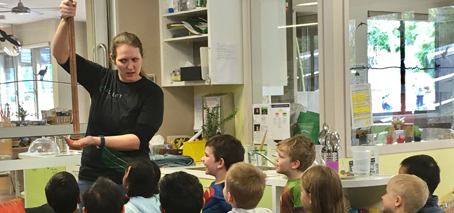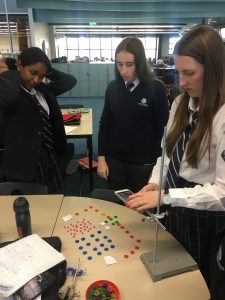Australian, public-funded physics centres share a responsibility to engage the Australian community with physics, with the aim of:
- Increasing the participation of students in science and physics
- Increasing understanding of and passion for science in the general public
- Improving the outreach skills of early-career (and senior!) physicists.
For example at FLEET (the ARC Centre of Excellence in Future Low-Energy Electronics Technologies), researchers—from students to senior investigators—are each required to spend at least 20 hours a year on public outreach efforts, which in 2019 drove engagement with over 10,000 school students and 11,000 members of the public, via participation in large public science festivals, lab tours, and partnerships with schools and universities.
ARC Centres such as FLEET communicate to the public the importance of their own work, and more generally of STEM research, in solving society’s largest problems.
Festivals Large public science events energise scientists as well as public. For example in 2019 a dozen FLEET scientists volunteered at the Sydney Science Festival, speaking to and demonstrating for over 9000 school students ranging from pre-schoolers to secondary school students.
Such outreach also builds valuable, transferable skills for the scientists themselves, who get to test and retest which explanations are clearest and most compelling – perfect training for later engaging a politician or industry contact!
Home-science experiments Hands-on activities cement scientific learning, and can introduce younger students (and parents) to easy, fun science experiments. FLEET has developed over 60 ground-tested, simple home-experiments using accessible, everyday items, with instructions including descriptions of the underlying scientific concepts, extension activities and links to the Australian teaching curriculum, where possible. FLEET.org.au/homescience
Engaging senior school students Senior school students, eager to embrace ‘hard’ physics, can be engaged directly in areas researched within the Australian physics community.
In 2019, FLEET launched a Year 10 ‘Future electronics’ course in partnership with John Monash Science School.
As well as covering the history of semiconductors and computing, the course represented Australia’s first introduction to superfluids and topological materials at the secondary school level. For most of the 35 students, the course was also their first introduction to quantum science.
FLEET members helped to develop and deliver the courses, building valuable skills within the Centre, and exposing students to a much more diverse cast of physicists than the ‘pale, stale and male’ 19th-century gentlemen whose names and biographies are traditionally taught in physics classes.
Students were engaged in the process of fine-tuning explanations of these physics topics, which are new enough that the most effective explanations have not yet been agreed upon, thus engaging the students in the challenges of science communication.
Pitching the subject matter in the crucial year before VCE allowed more freedom to explore new physics without the constraints of exam success.
Content covered the spectrum from fundamental atomic and quantum physics to computing and technology, including novel hands-on experiments and discussions, developed especially for the course, that cemented the new knowledge.



